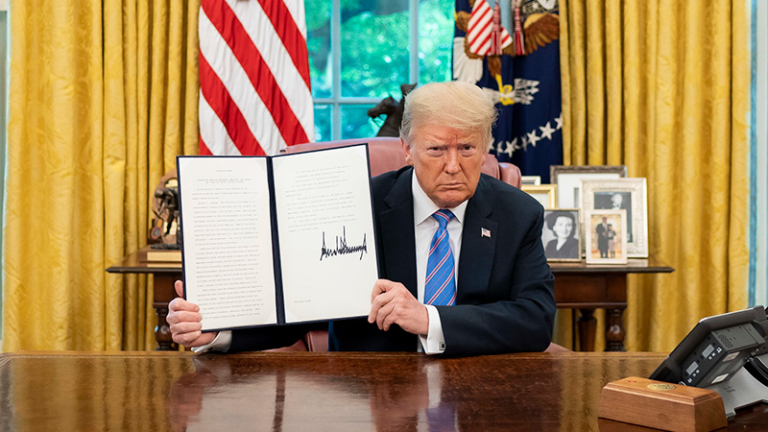
It is very hard to predict the foreign policy that president-elect Donald Trump will pursue because he is deeply and pathologically unpredictable. On both the domestic and foreign policy fronts, his policies are first and foremost an expression of—and channel for—his deeply narcissistic personality. There is little in the way of any kind of strategic sensibility or vision at work when he makes any decision. What counts most is his need for adulation and his contempt for those who do not regularly reinflate his brittle ego. This makes working with Trump an often-dangerous proposition.
The Trials and Tribulations of John Bolton
When he came to the White House, and even before, it was clear that part and parcel of Trump’s emotional defense mechanism was negating the president who came before him. Trump did so not because he grasped or even actually disliked the substance of Barack Obama’s policies but because he saw Obama’s popularity and legacy as a threat to his insatiable sense of grandiosity. Trump’s approach to Iran was a case in point. No one knows if he even read the Joint Comprehensive Plan of Action (JCPOA), the international agreement that Obama championed to deal with Iran’s nuclear program, before he withdrew the United States from it in May 2018. To put it simply, Trump hated the agreement because he despised his predecessor.
It is interesting and telling to note that John Bolton, who was Trump’s National Security Advisor from April 9, 2018, to September 10, 2019, had played a key role in urging the president to abrogate the JCPOA. But Bolton ultimately resigned because Trump’s singular focus was on retaining and expressing his power. As Bolton put it, Trump misused “the national government’s legitimate powers by defining his own personal interest as synonymous with the national interest.” He also noted: “I am hard-pressed to identify any significant Trump decision during my tenure that wasn’t driven by re-election calculations.” Of course, at the time of the decision itself, Bolton assumed there was some kind of strategic sense behind it. Indeed, he saw it as a prelude for negotiating a new deal on the nuclear issue with North Korea. But in the ensuing months, he learned what he should have known from the beginning: i.e., that Trump takes nothing seriously but himself and his exercise of power. It is difficult to see how Trump will approach the Middle East, and particularly Iran, with any more rationality, coherence, or predictability than he evinced during his first presidency.
Trump Wants Advisers Who Show Love but Avoid War
One might think that Trump’s clear allergy to getting the United States involved in a sustained shooting war overseas—one of his few good instincts—might incline him to cajole, press, or encourage Israel, Hezbollah, and Palestinian leaders in Gaza (whoever they might be), to forge a long-lasting ceasefire. Such a step might then set the stage for reviving the “Saudi option” that President Joe Biden desperately tried to secure regarding Saudi Arabia’s normalizing relations with Israel. But Israeli Prime Minister Benjamin Netanyahu has effectively rejected any bargain on ceasefires. He has done so because he is resolved to secure “victory” in both Gaza and Lebanon, and because the purpose of this victory is not only to inflict a mortal blow on Israel’s enemies but also to ensure that there will never be a Palestinian state of any kind on the West Bank. In advising Netanyahu “to finish up your war,” because “we have to get to peace. We can’t have this going on,” Trump gave the Israeli prime minister a green light to escalate.
Still, the idea that Trump will take any real steps to achieve “peace” (whatever that means) is a fantasy. In fact, the president-elect wants the Israel/Hamas/Hezbollah/Iran conflict to go away because the chaos that has enveloped the region may now grow worse, thus threatening to complicate his desire to show his followers and the world that he—and no one else—can fix this and any other problems. There is not much more to it than that. And yet he must still act quickly to build a foreign policy team that will indulge his ego and at the same time look reasonably credible to America’s friends and enemies.
If Bolton’s experience suggests the hazards of taking on such a role, there are plenty of other Washington based policy analysts out there who, it seems, have been angling to jump into the breach even before November 5. One of them could be Georgetown University professor and Atlantic Council Senior Fellow Matthew Kroenig, who, with Representative Michael Waltz (R-FL), agrees in a recent piece published in The Economist with Trump that Israel should finish the job against Hamas, that the next administration should challenge Iran and stop its nuclear ambitions and support for proxies, and that the United States should “maintain a military presence in the region.” Kroenig and his co-author also argue that once this is done, the United States should refocus on what they consider to be a “number one global enemy: China.” But quite apart from asking whether Netanyahu’s government—reconfigured on November 5 with the firing of Defense Minister Yoav Gallant—actually has a coherent military strategy in Lebanon and Gaza beyond that of sustaining the governing coalition at any political or human cost—Kroenig seems to think that the United States will now succeed with a “maximum pressure” policy on Iran that was a total failure when Trump was president.
More alarmingly, Kroenig and Waltz do not consider the real possibility that in pressing Israel to pursue a military campaign whose purpose is clearly to set the stage for a US strike on Iran’s nuclear facilities (a policy that Kroenig has long advocated), the new Trump White House could give Beijing ample opportunity to expand its outreach to Iran and Gulf Arab states. Having brokered the normalization of Saudi-Iran relations in March 2023 and the Beijing Declaration for Palestinian reconciliation, China is now looking for an opening to pursue a more robust diplomatic role. It is not clear if it has the means to exercise more influence. Still, the growing prospect of an even wider and more costly regional war prompted by another—and even greener American green light—to Israel could give Beijing reason to pursue the role of a regional peace maker. In short, the Kroenig Plan could easily and literally backfire.
Trump Hires and Fires
Trump is well aware of this possibility and may even push back when and if his new security advisors advocate for one or another version of this plan. Trump needs and craves the credibility he gets from bringing on board smart policy analysts who reject the policies of his predecessors. And yet as Bolton’s collision with Trump reminds us, the man who he now claims is “too stupid to be a fascist,” will chop off the political heads of any advisors who are not loyal to him, and/or who push for policies that could quickly blow up in his face. Anyone floating their credentials or policy proposals should consider the perils of working with a political leader whose love of his fragile self trumps all other considerations and interests.
The views expressed in this publication are the author’s own and do not necessarily reflect the position of Arab Center Washington DC, its staff, or its Board of Directors.
Featured image credit: Flickr/The White House

